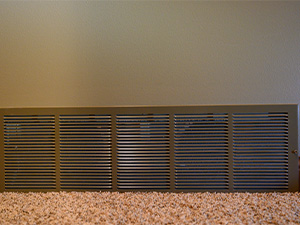
Filtration soil, aka soil filtration, refers to the dark, grayish lines that appear on carpets, typically along walls, under doors, around baseboards, or near HVAC vents.
This issue occurs when air-carrying pollutants pass through or across the carpet, leaving behind dirt, dust, and other airborne particles. The air, seeking an escape route, is often forced through small gaps, such as the space between the carpet and the baseboard or under closed doors. As the air passes through the carpet fibers, it deposits tiny particles of dust, pollen, smoke, and other contaminants, which gradually accumulate and darken the carpet over time.
The common sources of these pollutants include:
- Cooking oils
- Smoke from cigarettes or fireplaces,
- Dirt from outside,
- Pet dander, and even the
- General dust found in homes.
Poor ventilation and the presence of HVAC systems that circulate air can worsen the problem, leading to more noticeable soiling.
Fixes:
Removing filtration soiling can be challenging, but it is possible with the right approach. Here are some methods to address the issue:
- Professional Deep Cleaning: Professional carpet cleaning services often have specialized tools and cleaning solutions designed to tackle these stubborn stains.
- Targeted Spot Cleaning: For less severe areas, a specialized filtration soil remover can be applied directly to the affected areas. These products are designed to break down the oily and particulate residue that causes the dark lines.
- Regular Maintenance: To prevent the buildup of filtration soiling, frequent vacuuming, especially along the edges and near ventilation points, is crucial. Using high-efficiency particulate air (HEPA) filters in your vacuum cleaner can help capture finer particles.
What Not to Do:
When dealing with filtration soiling, avoid the following:
- Using Harsh Chemicals: Over-the-counter carpet cleaners with harsh chemicals may damage the carpet fibers or cause discoloration, making the problem worse.
- Scrubbing Vigorously: Excessive scrubbing can cause the fibers to fray or wear down, potentially spreading the soiling over a larger area and damaging the carpet’s appearance.
- Ignoring the Source: Simply cleaning the carpet without addressing the root cause of the soiling, such as poor ventilation or gaps along the baseboards, will result in the stains reappearing over time.
Preventive measures, combined with careful cleaning and regular maintenance, are the key to keeping carpets free from filtration soiling and extending their lifespan.
By Sharon Koehler. This article is one of a series of articles written and published on behalf of Surface Care PRO Partners.
